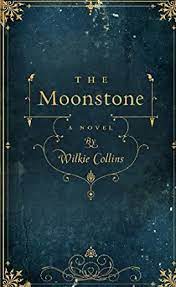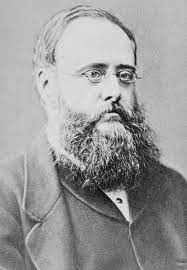The Moonstone Page #2
The Moonstone by Wilkie Collins is a 19th-century British epistolary novel. It is an early example of the modern detective novel, and established many of the ground rules of the modern genre. The story was serialised in Charles Dickens's magazine All the Year Round. Collins adapted The Moonstone for the stage in 1877.
opinion, to perform the duty that had been entrusted to him. There was riot and confusion enough in the treasury, but no violence that I saw. The men (if I may use such an expression) disgraced themselves good-humouredly. All sorts of rough jests and catchwords were bandied about among them; and the story of the Diamond turned up again unexpectedly, in the form of a mischievous joke. “Who’s got the Moonstone?” was the rallying cry which perpetually caused the plundering, as soon as it was stopped in one place, to break out in another. While I was still vainly trying to establish order, I heard a frightful yelling on the other side of the courtyard, and at once ran towards the cries, in dread of finding some new outbreak of the pillage in that direction. I got to an open door, and saw the bodies of two Indians (by their dress, as I guessed, officers of the palace) lying across the entrance, dead. A cry inside hurried me into a room, which appeared to serve as an armoury. A third Indian, mortally wounded, was sinking at the feet of a man whose back was towards me. The man turned at the instant when I came in, and I saw John Herncastle, with a torch in one hand, and a dagger dripping with blood in the other. A stone, set like a pommel, in the end of the dagger’s handle, flashed in the torchlight, as he turned on me, like a gleam of fire. The dying Indian sank to his knees, pointed to the dagger in Herncastle’s hand, and said, in his native language—“The Moonstone will have its vengeance yet on you and yours!” He spoke those words, and fell dead on the floor. Before I could stir in the matter, the men who had followed me across the courtyard crowded in. My cousin rushed to meet them, like a madman. “Clear the room!” he shouted to me, “and set a guard on the door!” The men fell back as he threw himself on them with his torch and his dagger. I put two sentinels of my own company, on whom I could rely, to keep the door. Through the remainder of the night, I saw no more of my cousin. Early in the morning, the plunder still going on, General Baird announced publicly by beat of drum, that any thief detected in the fact, be he whom he might, should be hung. The provost-marshal was in attendance, to prove that the General was in earnest; and in the throng that followed the proclamation, Herncastle and I met again. He held out his hand, as usual, and said, “Good morning.” I waited before I gave him my hand in return. “Tell me first,” I said, “how the Indian in the armoury met his death, and what those last words meant, when he pointed to the dagger in your hand.” “The Indian met his death, as I suppose, by a mortal wound,” said Herncastle. “What his last words meant I know no more than you do.” I looked at him narrowly. His frenzy of the previous day had all calmed down. I determined to give him another chance. “Is that all you have to tell me?” I asked. He answered, “That is all.” I turned my back on him; and we have not spoken since. IV I beg it to be understood that what I write here about my cousin (unless some necessity should arise for making it public) is for the information of the family only. Herncastle has said nothing that can justify me in speaking to our commanding officer. He has been taunted more than once about the Diamond, by those who recollect his angry outbreak before the assault; but, as may easily be imagined, his own remembrance of the circumstances under which I surprised him in the armoury has been enough to keep him silent. It is reported that he means to exchange into another regiment, avowedly for the purpose of separating himself from me. Whether this be true or not, I cannot prevail upon myself to become his accuser—and I think with good reason. If I made the matter public, I have no evidence but moral evidence to bring forward. I have not only no proof that he killed the two men at the door; I cannot even declare that he killed the third man inside—for I cannot say that my own eyes saw the deed committed. It is true that I heard the dying Indian’s words; but if those words were pronounced to be the ravings of delirium, how could I contradict the assertion from my own knowledge? Let our relatives, on either side, form their own opinion on what I have written, and decide for themselves whether the aversion I now feel towards this man is well or ill founded. Although I attach no sort of credit to the fantastic Indian legend of the gem, I must acknowledge, before I conclude, that I am influenced by a certain superstition of my own in this matter. It is my conviction, or my delusion, no matter which, that crime brings its own fatality with it. I am not only persuaded of Herncastle’s guilt; I am even fanciful enough to believe that he will live to regret it, if he keeps the Diamond; and that others will live to regret taking it from him, if he gives the Diamond away. THE STORY FIRST PERIOD THE LOSS OF THE DIAMOND (1848) The Events related by Gabriel Betteredge, house-steward in the service of Julia, Lady Verinder. CHAPTER I In the first part of Robinson Crusoe, at page one hundred and twenty-nine, you will find it thus written: “Now I saw, though too late, the Folly of beginning a Work before we count the Cost, and before we judge rightly of our own Strength to go through with it.” Only yesterday, I opened my Robinson Crusoe at that place. Only this morning (May twenty-first, eighteen hundred and fifty), came my lady’s nephew, Mr. Franklin Blake, and held a short conversation with me, as follows:— “Betteredge,” says Mr. Franklin, “I have been to the lawyer’s about some family matters; and, among other things, we have been talking of the loss of the Indian Diamond, in my aunt’s house in Yorkshire, two years since. Mr. Bruff thinks as I think, that the whole story ought, in the interests of truth, to be placed on record in writing—and the sooner the better.” Not perceiving his drift yet, and thinking it always desirable for the sake of peace and quietness to be on the lawyer’s side, I said I thought so too. Mr. Franklin went on. “In this matter of the Diamond,” he said, “the characters of innocent people have suffered under suspicion already—as you know. The memories of innocent people may suffer, hereafter, for want of a record of the facts to which those who come after us can appeal. There can be no doubt that this strange family story of ours ought to be told. And I think, Betteredge, Mr. Bruff and I together have hit on the right way of telling it.” Very satisfactory to both of them, no doubt. But I failed to see what I myself had to do with it, so far. “We have certain events to relate,” Mr. Franklin proceeded; “and we have certain persons concerned in those events who are capable of relating them. Starting from these plain facts, the idea is that we should all write the story of the Moonstone in turn—as far as our own personal experience extends, and no farther. We must begin by showing
Translation
Translate and read this book in other languages:
Select another language:
- - Select -
- 简体中文 (Chinese - Simplified)
- 繁體中文 (Chinese - Traditional)
- Español (Spanish)
- Esperanto (Esperanto)
- 日本語 (Japanese)
- Português (Portuguese)
- Deutsch (German)
- العربية (Arabic)
- Français (French)
- Русский (Russian)
- ಕನ್ನಡ (Kannada)
- 한국어 (Korean)
- עברית (Hebrew)
- Gaeilge (Irish)
- Українська (Ukrainian)
- اردو (Urdu)
- Magyar (Hungarian)
- मानक हिन्दी (Hindi)
- Indonesia (Indonesian)
- Italiano (Italian)
- தமிழ் (Tamil)
- Türkçe (Turkish)
- తెలుగు (Telugu)
- ภาษาไทย (Thai)
- Tiếng Việt (Vietnamese)
- Čeština (Czech)
- Polski (Polish)
- Bahasa Indonesia (Indonesian)
- Românește (Romanian)
- Nederlands (Dutch)
- Ελληνικά (Greek)
- Latinum (Latin)
- Svenska (Swedish)
- Dansk (Danish)
- Suomi (Finnish)
- فارسی (Persian)
- ייִדיש (Yiddish)
- հայերեն (Armenian)
- Norsk (Norwegian)
- English (English)
Citation
Use the citation below to add this book to your bibliography:
Style:MLAChicagoAPA
"The Moonstone Books." Literature.com. STANDS4 LLC, 2025. Web. 22 Feb. 2025. <https://www.literature.com/book/the_moonstone_1568>.








Discuss this The Moonstone book with the community:
Report Comment
We're doing our best to make sure our content is useful, accurate and safe.
If by any chance you spot an inappropriate comment while navigating through our website please use this form to let us know, and we'll take care of it shortly.
Attachment
You need to be logged in to favorite.
Log In